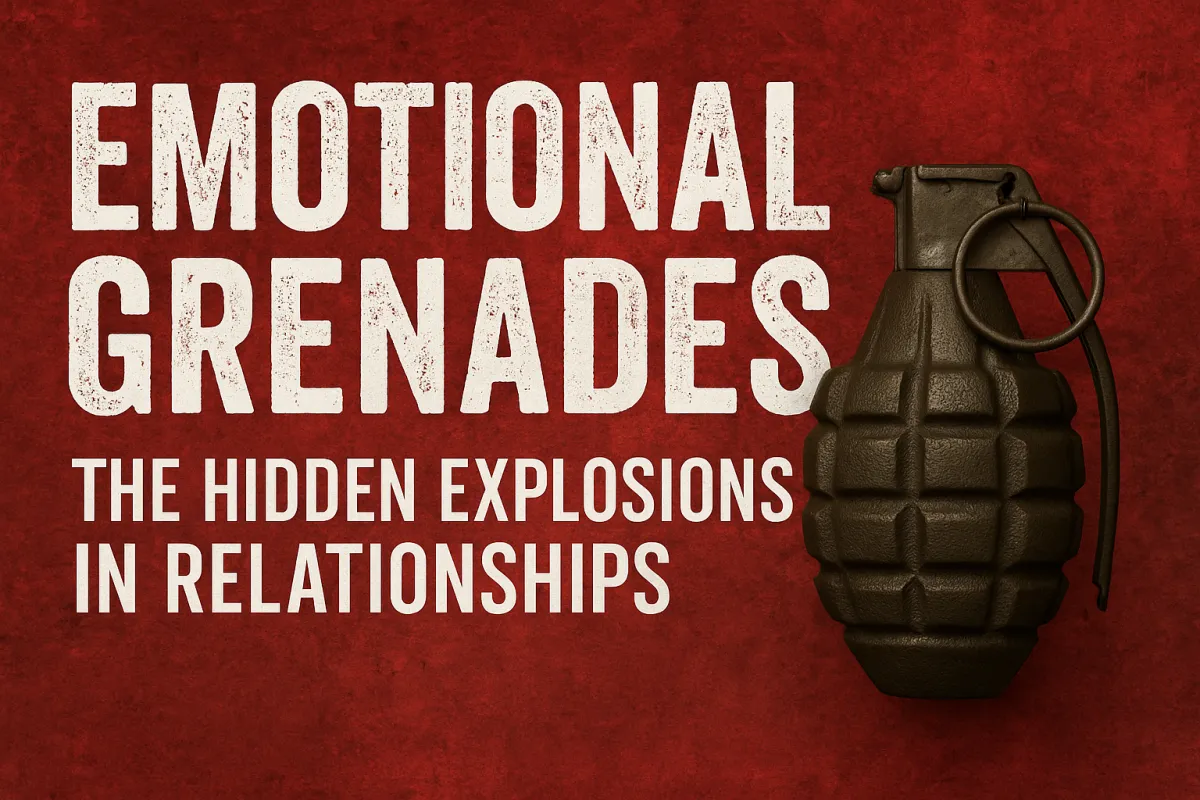
Emotional Grenades
📋 Blog: Emotional Grenades – How Unresolved Trauma Blows Up Connection
We’ve all been there. A small comment sparks a huge reaction. A minor misunderstanding spirals into an emotional explosion. Later, we wonder, Where did that come from?
The answer often lies in what I call emotional grenades—those unresolved wounds and unprocessed traumas that lie dormant until the right (or wrong) moment triggers them. This blog builds on our podcast episode, Emotional Grenades, and takes you deeper into the psychology, neuroscience, and healing tools behind the explosions that silently sabotage our relationships.
🪖 The Anatomy of an Emotional Grenade
Imagine your internal world as a complex ecosystem of memory, emotion, and instinct. Within that system, unresolved trauma doesn’t just disappear. It’s stored—especially in the body and nervous system—waiting for an opportunity to resurface.
This is where Internal Family Systems (IFS) gives us language. Parts of us—the wounded child, the critic, the protector—hold memories and emotions we didn’t feel safe to process at the time. When something in our present pokes at one of those wounds, the reaction comes not from our grounded adult self, but from that part. The grenade is pulled. The explosion happens.
🧠 Why It Happens: A Neurobiological Lens
Let’s layer in some neuroscience.
When we feel threatened emotionally, our amygdala—the brain’s alarm system—gets activated. This can hijack our rational brain (the prefrontal cortex) and flood the body with fight, flight, freeze, or fawn responses.
If you’ve ever snapped at someone you love, shut down mid-conversation, or felt paralyzed in a moment of conflict, that was likely your nervous system going into survival mode. These aren’t just bad habits—they're deeply embedded patterns of protection, often wired in early childhood.
🫠 How It Impacts Relationships
In high-stress relationships—especially between partners with trauma histories—emotional grenades are almost inevitable.
One person might explode with anger. Another might retreat into silence. Both are strategies that once protected us, but now create emotional distance, misunderstanding, and fear.
It’s not about bad people. It’s about unhealed pain that hasn’t had a safe place to land.
🛠️ How to Begin Disarming the Grenade
Healing begins with awareness and compassionate curiosity. Here are a few steps I invite you to explore:
1. 🧰 Pause and Identify the Part
Ask yourself: Who just showed up? Is this my protector? My abandoned inner child? My survival mode?
2. 👀 Locate It in the Body
Where is the feeling living? Your chest? Jaw? Shoulders? Place a hand there. Breathe into it. Let it know it’s not alone.
3. 🧡 Validate, Don’t Shame
Instead of saying, “Why am I like this?” try “Of course I feel this way. That part of me remembers pain.” Validation is the first step toward regulation.
4. 😊 Share Vulnerably
With a safe partner, therapist, or journal, practice saying what the part actually feels. Instead of “You don’t listen!” you might say, “A part of me feels invisible, and it gets loud when it’s scared.”
5. ♻️ Return for Repair
Emotional maturity is not about being untriggered. It’s about your ability to recognize rupture and return to reconnect.
💭 Why It Matters
Your relationships are the frontline of your nervous system. When you learn to respond from your Self rather than your scars, you don’t just heal a moment—you change a legacy.
This work is especially powerful for couples navigating trauma, high-stress professions, or parenting. When one person starts disarming their emotional grenades, it changes the entire dynamic.
And that healing ripples outward: into your home, your kids, your community.
🚨 Support the Movement
Our work through the RISEUP Phoenix Trauma and Crisis Institute is grounded in trauma recovery and community resilience. Right now, we’re raising $50,000 to equip Crisis Pods in Texas and Chicago for the upcoming disaster season.
These mobile support units provide:
Emotional first aid supplies
Tools for trauma-informed communication
Relationship support resources
And access to training for individuals and couples navigating crisis
If this blog spoke to you, I invite you to be part of the healing.
🔗 Donate: BATTLE2BE
🎧 Listen to the Podcast Episode: Emotional Grenades
#RISEUPVoices #RelationshipReset #TraumaHealing #EmotionalResilience #IFS #PolyvagalTheory #CrisisCare #RISEUPPhoenix
